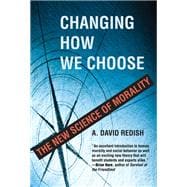The “new science of morality” that will change how we see each other, how we build our communities, and how we live our lives.
In Changing How We Choose, David Redish makes a bold claim: Science has “cracked” the problem of morality. Redish argues that moral questions have a scientific basis and that morality is best viewed as a technology—a set of social and institutional forces that create communities and drive cooperation. This means that some moral structures really are better than others and that the moral technologies we use have real consequences on whether we make our societies better or worse places for the people living within them. Drawing on this new scientific definition of morality and real-world applications, Changing How We Choose is an engaging read with major implications for how we see each other, how we build our communities, and how we live our lives.
Many people think of human interactions in terms of conflicts between individual freedom and group cooperation, where it is better for the group if everyone cooperates but better for the individual to cheat. Redish shows that moral codes are technologies that change the game so that cooperating is good for the community and for the individual. Redish, an authority on neuroeconomics and decision-making, points out that the key to moral codes is how they interact with the human decision-making process. Drawing on new insights from behavioral economics, sociology, and neuroscience, he shows that there really is a “new science of morality” and that this new science has implications—not only for how we understand ourselves but also for how we should construct those new moral technologies.








